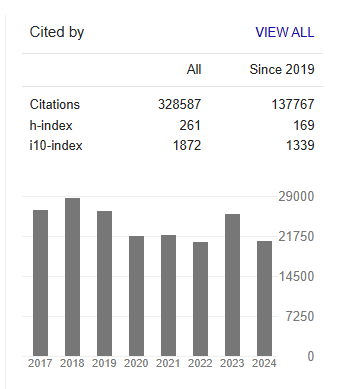Researchers and authors can directly submit their manuscript online through this link Online Manuscript Submission.
Author Guidelines
Journal DOI: 10.33140/ATCP
Advances in Theoretical & Computational Physics (ISSN: 2639-0108) is an open access journal for those involved in teaching or practice in the fields of “Theoretical & Computational Physics” as well as organizational development and education connected to these areas of interest. We particularly welcome high-quality original research that advances knowledge on these topics generalizable to other settings and countries. In addition to research papers, we welcome less formal contributions, including short reports, which would make the journal more accessible.
Open Access Policy: The Open Access Policy allows everyone to freely view, copy, download, and print all published papers without any legal, technical, or financial barriers.
Plagiarism Analysis: To ensure originality, all articles must contain at least 75% unique content that is not copied from any other web sources. In the Results and Conclusion section, the uniqueness must be 100%. If the uniqueness falls below 75%, the article will be returned to the author for revision and asked to be resubmitted with adequate uniqueness.
Article Processing Charges
As an Open Access journal, publishing in Advances in Theoretical & Computational Physics requires an Article Processing Charge (APC) of $3019, which will be invoiced upon acceptance of your article. There are no additional fees, such as submission, page, or color charges. Refunds are not available once payment is processed.
Article Processing Charges
As an Open Access journal, publishing in Advances in Theoretical & Computational Physics requires an Article Processing Charge (APC) of $3019, which will be invoiced upon acceptance of your article. There are no additional fees, such as submission, page, or color charges. Refunds are not available once payment is processed.
Please contact the editors for further information.
Article Types
Advances in Theoretical & Computational Physics accepts Original Articles, Review, Mini Review, Editorial, Letter to the Editor, Commentary, Rapid Communications and Perspectives, and Conference Proceedings.
In general, the Manuscripts are classified into the following groups based on the criteria noted below. The author(s) are encouraged to request a particular classification upon submitting (please include this in the cover letter); however the Editor and the Associate Editor retain the right to classify the manuscript as they see fit, and it should be understood by the authors that this process is subjective to some degree. The chosen classification will appear in the printed manuscript above the manuscript title.
Note: Authors must prepare and submit a cover letter with their manuscript
Manuscript Formatting Guidelines
Manuscript Title: The title should be limited to 25 words or less and should not contain abbreviations. The title should be a brief phrase describing the contents of the paper.
Author Information: Complete names and affiliation of all authors, including contact details of corresponding author (Telephone, Fax and E-mail address).
Abstract: The abstract should be informative and completely self-explanatory, briefly present the topic, state the scope of the experiments, indicate significant data, and point out major findings and conclusions. The abstract should summarize the manuscript content in 300 words or less. Standard nomenclature should be used and abbreviations should be avoided. The preferable format should accommodate a description of the study background, methods, results and conclusion. Following the abstract, a list of keywords (3-10) and abbreviations should be included.
Text
Introduction: The introduction should set the tone of the paper by providing a clear statement of the study, the relevant literature on the study subject and the proposed approach or solution. The introduction should be general enough to attract a reader’s attention from a broad range of scientific disciplines.
Materials and Methods: This section should provide a complete overview of the design of the study. Detailed descriptions of materials or participants, comparisons, interventions, and types of analysis should be mentioned. However, only new procedures should be described in detail; previously published procedures should be cited and important modifications of published procedures should be mentioned briefly. Capitalize trade names and include the manufacturer’s name and address.
Results: The results section should provide complete details of the experiment that are required to support the conclusion of the study. The results should be written in the past tense when describing findings in the authors’ experiments. Previously published findings should be written in the present tense. Results and discussion may be combined or in a separate section. Speculation and detailed interpretation of data should not be included in the results but should be put into the discussion section.
Acknowledgment: This section includes acknowledgment of people, grant details, funds, etc.
References: Only published or accepted manuscripts should be included in the reference list. Meetings abstracts, conference talks, or papers that have been submitted but not yet accepted should not be cited. All personal communications should be supported by a letter from the relevant authors.
Authors are requested to provide at least one online link for each reference as follows (preferably PubMed).
All manuscripts should be written in English and numbered all the pages consecutively beginning with the title page.
Copyright
Submission of a manuscript implies that the work described has not been published before (except in the form of an abstract or as part of a published lecture, or thesis) and that it is not under consideration for publication elsewhere.
All works published by “Advances in Theoretical & Computational Physics” are under the terms of the Creative Commons Attribution License. This permits anyone to copy, distribute, transmit, and adapt the work provided the original work and source are appropriately cited.
Copyright
Submission of a manuscript implies that the work described has not been published before (except in the form of an abstract or as part of a published lecture, or thesis) and that it is not under consideration for publication elsewhere.
All works published by “Advances in Theoretical & Computational Physics” are under the terms of the Creative Commons Attribution License. This permits anyone to copy, distribute, transmit, and adapt the work provided the original work and source are appropriately cited.



